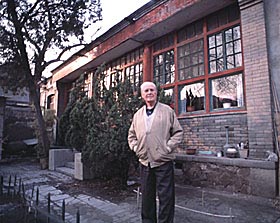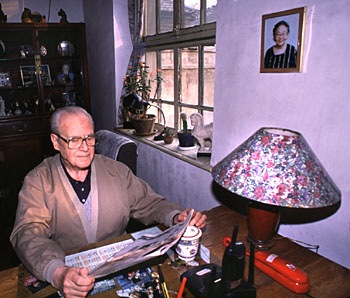Old American breaks bagels in China
Among the last of a dying breed of fervent American fans of Communism, is one aged author who explores the mysteries of the ancient Jews of Kaifeng. Fitting, because a half century after leaving New York for the People's Republic, he's probably the oldest Jew in China.
By Ron Gluckman /Beijing
AMONG INNUMERABLE CURIOSITIES curiosities interwoven in the long, mutually-rich history of two of the world’s oldest peoples is the vexing question of where and when they first met. The answer, according to most historians, is well over a thousand years ago. Evidence suggests the initial interaction likely occurred as Jewish traders migrated along the Silk Road, eventually reaching the ancient city of Kaifeng.
How and why they came to Kaifeng, and what happened to them has long been a topic of debate, not only amongst scholars. Marco Polo noted Jewish residents in 13th Century reports from China. The first Jesuit missionaries posted to China four hundred years ago enthusiastically described the discovery of a lost tribe of Chinese Jews in Kaifeng, but admitted bafflement over their exact origins.
Few clues remain in Kaifeng, a Henan Province city that was Imperial capital during the Song Dynasty. Kaifeng isn’t unique. Hangzhou, Luoyang, Quanzhou, Nanjing and Ninbo also claimed ancient Jewish settlements. Kaifeng, though was the largest. In Kaifeng, Jews built a synagogue (temple), but all traces of it and their settlement long ago vanished
The Jesuits sent researchers to Kaifeng to try to unravel the mystery. They had no more luck than European Jews from Shanghai at the turn of the century, and more recent teams from as far away as Israel and America. All were hot for signs of Jewish heritage but the trail in Kaifeng has long gone ice cold. A warmer path leads through the ancient alleyways of central Beijing, where, inside a small, traditional Chinese house, lives author Sidney Shapiro – who unquestionably claims the oldest remaining Jewish household in all of China.
 Shapiro
doesn’t claim to know all the answers about what befell the Jews in old China.
Still, few know more about the Kaifeng Jews better than Shapiro, who also is the
world’s leading authority on an old Jew in New China - himself.
Shapiro
doesn’t claim to know all the answers about what befell the Jews in old China.
Still, few know more about the Kaifeng Jews better than Shapiro, who also is the
world’s leading authority on an old Jew in New China - himself.
Shapiro a former New Yorker who has resided in China since in 1947, is author of many books, including two on these topics. Both have been out for years, but recently reappeared in new form. Shapiro’s "Jews in Old China," a collection of papers by Chinese scholars about the Kaifeng Jews, was reissued this year (Hippocrene Books; 256 pages; $14.95) with three new chapters. Shapiro’s 1997 autobiography, "My China: The Metamorphosis of a Country and a Man," previously available mainly in China, has been reissued as "I Chose China." (Hippocrene, 355 pages; $24.95)
Despite a few connections, the books are really as different as night and day. "Jews in Old China" is an ambitious academic work that endeavors to collect and translate into English everything written about the Kaifeng Jews in Chinese. As such, it is an unparalleled undertaking, since few of these essays are familiar even to western scholars with a special interest in this subject.
However, "Jews in Old China" is also the more disappointing of the books, though not because of any fault of the author. Shapiro visited Kaifeng and spent years tracking down and translating these papers, but the essays suffer from extensive repetition and skimpy detail. The Kaifeng Jews left behind only a few ancient inscriptions. These details are recounted endlessly by Chinese scholars with, at best, limited knowledge of Jews and their various migrations. That’s understandable, seeing as most scholars in China have had no access to such basic materials as the bible or Talmud for decades.
"I Chose China," in contrast, tackles an enormous topic - the past half-century of Chinese history - but achieves fine focus by telling the story of one observer. It’s by no means comprehensive, nor does it pretend to be an authoritative behind-the-scenes look at the People’s Republic of China. It’s simply the life story of an individual in remarkable surroundings at a clear turning point in history.
Not that Shapiro should be considered a minor character in modern China. He still enjoys considerable insight into the nation’s political machinery as a member of the Chinese People's Political Consultative Council. Since 1963, he has been a citizen of China. Although never a member of the Communist Party, he’s among the last of a small collection of quixotic foreign sympathizers who came during its underground days and stayed on after the establishment of the PRC.
Long retired from the state-run Foreign Language Press, Shapiro, now 85, still spends days at his computer, batting out letters, working on book projects, or navigating the web. He is spry and lucid, joking loudly, and often, but always with a gentile manner. He serves tea and peanuts – standard People’s fare – in his chilly courtyard home of 40 years. It’s packed with well-worn furniture and one concession to his homeland, Louis Armstrong on the stereo.
Shapiro almost never made it to China. Picked by the United States Army for a crash program to train Chinese translators for a possible mainland landing, he continued his language courses after the project was scuttled. After World War II ended, he decided to whet his curiosity. "I went to China in 1947 to have a look around," he says, chuckling as he adds: "And I’m still looking.
"There is so much change, that’s what’s always been amazing about China," he notes, shaking his head. "And it’s still changing.
A Jewish lawyer from New York, Shapiro arrived in Shanghai at a chaotic moment. The city still hadn’t recovered from wartime bombing and the Japanese occupation. Once a flourishing international port, Shanghai was torn by battles between the ruling Kuomintang (KMT) and the Communist Party. "It was a horrible time. There were bodies in the streets, everywhere," he recalls.
Still, it was also an exhilarating time for a new immigrant with no ties to his old land. Offered work with a local law firm, Shapiro decided to stay "and see what happened next." Language exchanges with a Chinese woman blossomed into romance; a year later he married Phoenix, an actress and leader of a Communist support group. Fleeing the KMT, the pair moved north to try to reach the rebel army. Turned back by authorities, they only retreated to Beijing, where they were on hand to welcome the arrival of the People’s Liberation Army. Shapiro’s description of the PLA entry to Beijing is one of many highlights in the book.
Shapiro spent the next half-century as a translator of Chinese literature. Among his prized accomplishments is an English version of the Chinese classic "Shui Hu Zhuan," a sort of Robin Hood tale from the 14th Century. It had been translated many times, most notably as "All Men Are Brothers," by Pearl Buck. Shapiro’s version was called "Outlaws of the Marsh," and was recently reissued as part of a massive bi-lingual collection called "Library of Chinese Classics."
His translation comprises five volumes of the collection. A big smile spreads across his face as he pulls one from his bookshelves and thumbs through the lavishly-illustrated edition. "This is my bid for immortality," he says proudly.
Shapiro credits the book with saving him during the Cultural Revolution, when his wife was hauled off and his department rocked by horrible infighting. "Factions formed, like everywhere else, with all sides arguing over which was the most Marxist. They fought, not just verbally, but physically. Six guys were killed at the office. It was terrible and it went back and forth, with one side capturing the administration and torturing their enemies.
"But they left me alone," he says, emerging from a rare dark mood. "It was because of the book. They both wanted credit for producing it."
The Cultural Revolution prompts harsh criticism. "Mistakes were made," says Shapiro. He attributes this, like many other Chinese shortcomings, to the country’s inability to break free of its feudal past. The worst transgressions, he blames "on opportunists. Those I call holier than Mao."
 Shapiro’s
memoir, not surprisingly, voices steady support for the government. It sometimes
reads like overzealous cheerleading, for instance when refuting the notion of
discontent in Tibet, especially since Shapiro concedes during our chat that he
has never actually visited Tibet. Yet he isn’t a vapid-headed propagandist
either. While he generally takes China’s side, especially against foreign
reporters who, too often, have a habit of "taking a big stick to
China," he can also discuss the failings of the government he has spent
most of his life serving.
Shapiro’s
memoir, not surprisingly, voices steady support for the government. It sometimes
reads like overzealous cheerleading, for instance when refuting the notion of
discontent in Tibet, especially since Shapiro concedes during our chat that he
has never actually visited Tibet. Yet he isn’t a vapid-headed propagandist
either. While he generally takes China’s side, especially against foreign
reporters who, too often, have a habit of "taking a big stick to
China," he can also discuss the failings of the government he has spent
most of his life serving.
This candor is one of the charms of his autobiography (actually his second; the first appeared in the 1970s. "I’m ashamed to think that I thought I had so much more to say," he quips). The China shelves are already crammed with far too many books pounded out in a year or two visiting reporters, or after a two-week bike tour by some wide-eyed westerner. While "I Chose China" is clearly in the pro-China camp, it also offers refreshing insight into tumultuous events of the past half-century by one man who fell in love with a foreign land.
That gives "I Chose China" wide appeal. In contrast, "Jews in Old China" has more niche appeal to scholars. Ultimately, though, its greatest failing is the inability to answer the major questions of why Jews went to Kaifeng, why they stayed and, most important, why they vanished.
In his defense, the author implies the answers are obvious. Time and distance wore down old religious beliefs and assimilation took its toll. Shapiro’s comment that "there has never been any racial discrimination in China" is a bit over-the-top (tell that to any African diplomat posted in China), yet his point about the lack of pogroms against Jews in China is poignant. No evidence suggests Jews were treated worse than Muslims or Christians or any other Foreign Devils.
To be sure, persecution has played a significant role in fortifying Jewish faith, however tragic the consequences. Still, that doesn’t explain why Kaifeng’s Jews assimilated, since communities survived for centuries in isolation in India and Egypt. One expects better theories, especially from someone who has lived for a half century in China, yet still describes in mouth-watering detail bagels and pastrami left behind in his strong Bronx accent.
Ron Gluckman is an American reporter who is based in Beijing, and writes for a wide variety of publications including Asia's largest English daily, the South China Morning Post, which ran a version of this piece on March 27, 2001. This is the original version of the story.
For more on Jews in China, look at the various stories Ron has written about the intriguing Jewish community that flourished in Shanghai before World War II; see listings in China pages.
To return to the opening page and index
push here
[right.htm]
